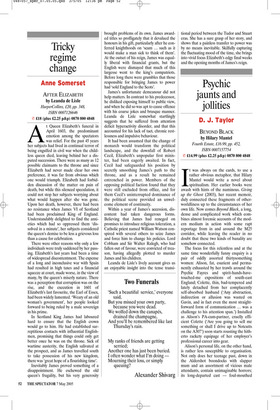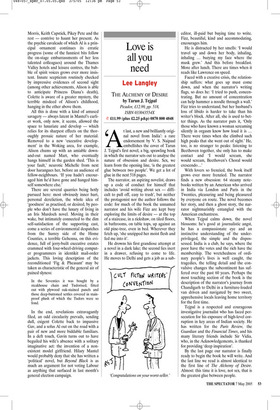Psychic jaunts and jollities
D. J. Taylor
BEYOND BLACK by Hilary Mantel Fourth Estate, £16.99, pp. 452, ISBN 0007157754 ✆ £14.99 (plus £2.25 p&p) 0870 800 4848 It was always on the cards, to use a rather obvious metaphor, that Hilary Mantel would write a novel about spiritualism. Her earlier books were awash with hints of the numinous. Giving up the Ghost (2003), her recent memoir, duly connected these fragments of otherworldliness up to the circumstances of her own life. Now comes Beyond Black, a long, dense and complicated work which combines almost forensic accounts of the modern medium in action with some rapt reportage from in and around the M25 corridor, while leaving the reader in no doubt that these two kinds of banality are somehow connected.
The focus for this relentless and at the same time wonderfully funny enquiry is a pair of oddly assorted thirtysomething women: Alison, fat, esurient and permanently exhausted by her trawls around the Psychic Fayres and spirit-hands-havetouched-me expositions of south-east England; Colette, thin, bad-tempered and lately detached from her complacently self-absorbed husband (‘Any abstraction, indirection or allusion was wasted on Gavin, and in fact even the most straightforward form of communication ... was a challenge to his attention span.’) Installed as Alison’s PA-cum-partner, cruelly efficient Colette (‘Are you going to sell me something or shall I drive up to Notcutts on the A30?’) soon starts rousting the hitherto rackety equipage of her employer’s professional career into gear.
Alison’s personal life, on the other hand, is rather less susceptible to organisation. Not only does her teenage past, down in the Aldershot boondocks with slapper mum and an assortment of vicious male attendants, contain unimaginable horrors; its long-departed cast — foul-mouthed Morris, Keith Capstick, Pikey Pete and the rest — contrive to haunt her present. As the psychic cavalcade of which Al is a principal ornament continues its erratic progress (some of the funniest bits follow the on-stage embarrassments of her less talented colleagues) around the Thames Valley hotels and leisure centres, the babble of spirit voices grows ever more insistent. Innate scepticism routinely checked by impressive evidences of second sight (among other achievements, Alison is able to anticipate Princess Diana’s death), Colette is aware of a greater mystery, the terrible misdeed of Alison’s childhood, hanging in the ether above them.
All this is done with a kind of amused savagery — always latent in Mantel’s earlier work, only now, it seems, allowed the space to luxuriate and develop — which relies for its sharpest effects on the thoroughly prosaic nature of her material. Removed to a new ‘executive development’ in the Woking area, for example, Alison chums up with an amiable downand-out named Mart, who eventually hangs himself in the garden shed. ‘This is your fault,’ neurotic Michelle from next door harangues her, before an audience of fellow-neighbours. ‘If you hadn’t encouraged him he’d have gone and hanged himself somewhere else.’ There are several quarries being hotly pursued here: most obviously inner hurt, personal dereliction, the whole idea of ‘goodness’ as practised, or desired, by people who don’t have the luxury of living in an Iris Murdoch novel. Moving in their wake, but intimately connected to the dim self-satisfaction of the supporting cast, come a series of environmental despatches from the Surrey side of the Home Counties, a terrible Gehenna, on this evidence, full of jerry-built executive estates crammed with four-wheel-driving computer programmers in identikit mail-order jackets. This loving description of the reconditioned ‘Fig & Pheasant’ may be taken as characteristic of the general air of pained slyness:
In the Seventies it was bought by a steakhouse chain and Tudorised, fitted out with plywood oak-stained panels and those deep-buttoned settles covered in stainproof plush of which the Tudors were so fond.
In the end, revelations extravagantly filed, an odd circularity prevails, sending dull, exigent Colette back to impassive Gav, and a solus Al out on the road with a pair of new and more biddable familiars. In a deft touch, Gavin turns out to have beguiled his wife’s absence with a solitary imaginative act: the invention of a nonexistent model girlfriend. Hilary Mantel would probably deny that she has written a ‘political’ novel, but Beyond Black is as much an argument for not voting Labour as anything that surfaced in last month’s general election campaign.




























































 Previous page
Previous page